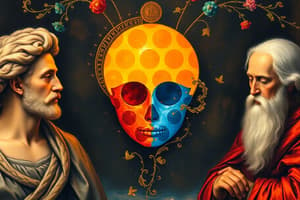Podcast
Questions and Answers
Socrates lived during the 5th century B.C.
Socrates lived during the 5th century B.C.
True (A)
Socrates believed that a life without reflection is valuable.
Socrates believed that a life without reflection is valuable.
False (B)
Socrates' quote suggests that self-examination is essential for a fulfilling life.
Socrates' quote suggests that self-examination is essential for a fulfilling life.
True (A)
The statement 'The examined life is worth living' was made by Plato.
The statement 'The examined life is worth living' was made by Plato.
Socrates is known for his contributions to mathematics.
Socrates is known for his contributions to mathematics.
According to Socrates, the true self is identified with our body.
According to Socrates, the true self is identified with our body.
Socrates believed that our social status is part of our true self.
Socrates believed that our social status is part of our true self.
The true self includes our possessions and reputation.
The true self includes our possessions and reputation.
Socrates claimed that the essence of our self is our soul.
Socrates claimed that the essence of our self is our soul.
The concept of the true self includes elements of external identity.
The concept of the true self includes elements of external identity.
Flashcards are hidden until you start studying
Study Notes
The True Self: Philosophical Perspectives
- The true self is associated not with material possessions, social status, or physical form, but is identified with the soul, according to Socrates.
- Socrates (496-399 B.C.) famously stated, "The unexamined life is not worth living," highlighting the importance of self-reflection.
Plato's View of the Self
- Plato (428-348 B.C.) characterized the self as an "immortal soul residing in a perishable body."
- The soul comprises three parts:
- The rational element, immortal and pre-existing the body.
- The courageous or spirited element, which is mortal.
- The appetitive part, also mortal.
- Only the rational part of the soul survives death, while the spirited and appetitive elements perish.
Socratic Analysis
- Socrates distinguished between the physical body, which is mutable and mortal, and the immortal soul.
- While alive, both body and soul exist together, but the soul’s true essence resides in an ideal, eternal realm.
Importance of Self-Knowledge
- Socrates emphasized the need for self-knowledge, advocating that true understanding involves recognizing one's character and attitudes.
Plato's Republic Insights
- In "The Republic", Plato refers to the soul as the "giver of life to the body," viewing it as permanent and divine, contrasting with the body’s transient nature.
- Life is depicted as an ascent toward the world of ideas, where the soul strives for liberation from the body's constraints.
St. Augustine's Synthesis
- St. Augustine (354-430 A.D.) merged Greek philosophical insights with biblical truths, portraying the self as a unity of body and soul.
- Emphasized that humans are created in God's image and can find peace through recognizing and responding to God’s love.
Aristotle's Comprehensive Approach
- Aristotle (384-322 B.C.) stressed the significance of reason and the holistic development of physical, economic, and social aspects of a person.
- He defined human happiness as a result of the balanced cultivation of wisdom and virtue, known as the Golden Mean, which encourages moderation in all aspects of life.
St. Augustine on Happiness
- According to St. Augustine, true happiness is found only in God, encapsulated in his belief that humans were created to seek peace in divine rest.
- Virtue, defined by St. Augustine, includes love for God and fellow humans, advocating a moral code of treating others as one wishes to be treated.
St. Thomas Aquinas' Contributions
- St. Thomas Aquinas (1225-1274) prioritized the role of reason in understanding truth, claiming certainty through rational thought.
- He acknowledged the necessity of divine revelation for certain truths and argued that human fulfillment is found in the development of one’s inherent powers, leading to perfection and happiness.
- Aquinas shared Augustine's view that the human soul, restless until fulfilled, finds its true resting place in God.
Studying That Suits You
Use AI to generate personalized quizzes and flashcards to suit your learning preferences.




